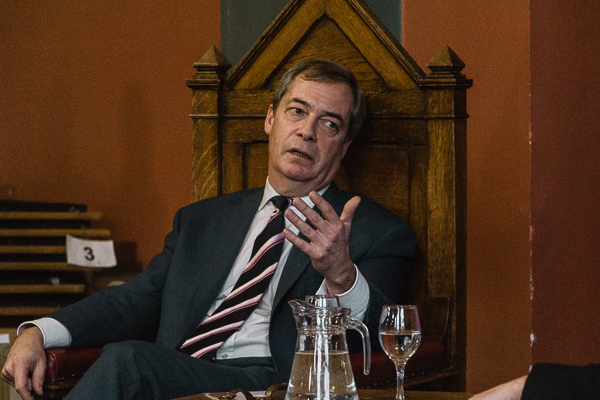
For months, guests to Trinity’s societies have come with warnings: resist the rise of populism, fight for facts and truth and defend progressive politics.
It wouldn’t be an overstatement to say that the shadow of Donald Trump has loomed large over the Graduates Memorial Building this year.
Today, we got a glimpse of the budget-Brexit version. Former UK Independence Party Leader Nigel Farage’s speech led up to its own, somewhat predictable, call for Ireland to consider its own place in the EU. He presented it as logical, sensible and in Ireland’s economic interest. And if Farage’s career has been based on divide-and-conquer politics, his speech today asked Ireland to choose its loyalties carefully.
To audience applause, he pitched himself as Ireland’s own white knight in the Brexit negotiations, labelling Taoiseach Leo Varadkar as the “Irish Blair” and asking where his interests really lie. He pledged World Trade Organisation and White House support for any special relationship between the UK and Ireland, after the country leaves the EU.
“Every single person on the Brexit campaign, and this includes the DUP campaign in Northern Ireland, wants us to continue having a good trade relationship in the future”
If moderator and Irish Times journalist Pat Leahy was an apt choice – he took Farage to task point by point – he procured little new. “I think there’s a real chance we might have to fight this all over again”, Farage told Leahy, but he danced around suggestions of a second referendum.
But for all the furore over former UK Independence Party (UKIP) leader Nigel Farage’s protest, his talk today was remarkably dull. Aside from a heavier security presence than normal, it could have been any other guest, even if few guests in the last decade have gone from the outskirts of politics – the zone of “fruitcakes, loonies and closet racists” – to claiming responsibility for the partial fracturing of the EU.
In his speech today, it took one minute for Farage to get onto the issue of sovereignty and returning power to the UK. It took him two minutes to attack the no-platforming debate that had dominated the build up to his arrival.
Referencing former British National Party leader Nick Griffin, whose own visit to Trinity a few years ago caused a similar furore, Farage tickled and taunted the audience. He got applause for his criticism of no platforming – he called it a “threat to freedom of speech” and a threat to the “whole democratic process”.
“Listen respectfully, even to arguments you fundamentally disagree with. By putting a bit of sunshine on to something, it can be a bit of disinfectant on some really bad views”, he said.
Many would have said Farage’s visit today was divisive. But to call him a divisive figure is to misunderstand it – he’s loathed equally by people across large swathes of the political spectrum. And he appears to enjoy it: “To listen to the mainstream press, you’d think I was the reincarnation of Adolf Hitler.”
But he had fans in the GMB today. Two male audience members – in an audience that was majority men – wore “Make America Great Again” hats, while he received plenty of applause throughout his speech. Indeed, most of his detractors chose to avoid the GMB today.
Yet Farage’s Brexit legacy is still being shaped – and it’s well outside his control. He admitted it himself and made it the subject of his displeasure. “We’re limping towards Brexit”, he said.
UK Prime Minister Theresa May, he said, “is really bad, she doesn’t believe in it, we’ve hit a fork in the road and she’s trying to straddle it”.
Farage is something of a man adrift. His old party, established for the sole aim of exiting the EU, is falling asunder without the charismatic leadership he provided. While he’s now finding his home in headlines and radio shows, the man who brought a revolution to the UK seems to have trouble finding his next skirmish.
But Farage has history on his mind. “2016, I think, marked the pivot for a completely new political order”, he said. He praised Catalonia and Hungary in the same breath, adding separatist groups and Viktor Orban to his anti-EU crusade.
He was sensitive when challenged, growing agitated at times as audience members and Leahy alike tried to dig for truth. As Farage attacked the European Court of Justice, Leahy reminded him that Ireland and the UK had signed up of their own volition. “Stop pretending you can be sovereign and a member of the European Union. You can’t”, Farage shot back.
When one audience member pointed to the lies of the leave side in the EU referendum, he hit back: “You’re quite right to talk about lies. Fifty years of them.” The sin, he said, of the EU’s misinformation over the decades was a greater crime than a few creative statistics.
“I’ve done more than any politician since 1945 to destroy the far-right in Britain”, he told the audience at the end of today’s talk. A lie, of course. But if his calling card is shock populism, Farage’s brand of nationalism has become all too predictable.






